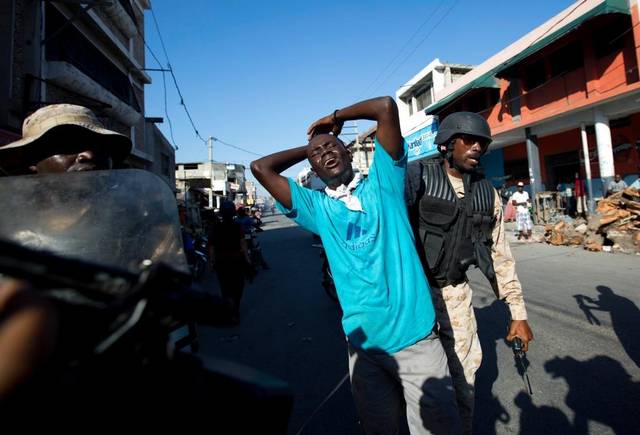Dieu Nalio Chery/AP
By
Ricardo Swire
The gap between the powerful and powerless grows wider each day. Corruption spreads faster than shame. Evidence exhibits that power is abused in all social and professional circles.
Recent civil society surveys suggested the problem is especially acute in the Global South. The cycle of corruption is represented by international media headlines that feature from India’s political graft, white collar crime on Wall Street, to bribery of China’s government regulators. Some developing countries appear especially vulnerable to corruption and tyranny.
Corruption has proven itself as the currency of a social transaction, in an egregiously unequal society, where power remains concentrated in the hands of a minority clique. According to the World Bank’s global governance indicators, corruption within governments is a severe problem. Within the Caribbean membership Haiti’s legislation governs residents and financial institutions. The national document forbids corruption and money laundering.
Article 173 of Haiti’s criminal code addresses bribes or attempted bribes towards a public employee. The Constitution dictates that senior officials and parliamentary representatives, formally accused of corruption, be prosecuted before the Senate rather than within Haiti’s judicial system. Domestic law also features special sections that govern forfeiture and seizure of assets. In July 2013 internal security professionals in conjunction with Haitian National Police (HNP) officers, acting on gathered intelligence, utilized one provision to detain and charge several high profile, connected Haitian nationals.
A close associate of Haiti’s president of the day, the presidential driver, a local media personality, a journalist and a radio icon were charged with corruption. The president’s associate sold forged Haitian government badges. The radio personality, a Haitian Customs Directorate employee by profession until September 2012, masqueraded as “General Customs Coordinator” and issued the fake badges. A criminal breach of security that exposed Haiti’s Customs offices and facilities to vulnerability.
In June 2015 the Brigade of Operation & Departmental Intervention (BOID) was established. The special unit comprised eighteen females, among two hundred and seventy-five para-military personnel, specially trained by Minustah and UNPOL. On November 20 2016 Haiti’s overdue senate elections were convened in Grand Anse province. The victorious six year term senator is a national fugitive, wanted for organizing an armed attack against the Les Cayes Police Station, on Haiti’s southern peninsula.
On May 5 2016 a HNP Chief Inspector reported that fifty unidentified gunmen, dressed in camouflage outfits similar to the disbanded Haitian Army uniform, attacked the Les Cayes Police station and killed one HNP officer. Two other officers were injured and a gunman killed by gunfire. Three attackers died in a botched escape attempt, after the driver of a white van transporting them lost control and crashed in a ravine.
The new Haitian senator, a former HNP officer, is fluent in four languages and was an active member in the 2004 coup against Haiti’s president of the day. He coordinated a group of insurrectionists based in Gonaives province. The senator has outstanding Drug Enforcement Administration (DEA) warrants for “conspiracy to import cocaine and money laundering.” The DEA’s Miami Division features him on its Most Wanted List. Human Rights Watch accuses the Haitian senator of extrajudicial killings.
General public’s mental map of official immorality reflects political blind spots. The casual observers tend to indict obvious crimes, without interrogating structures and historical inequities. Official transgressions cut especially deep where rules are slackened to attract private investment or “development aid.” In Haiti’s 2010 earthquake Transparency International (TI) traced the extreme death toll to “alleged corruption in the construction of public buildings, including schools and hospitals.”
During the Caribbean member’s reconstruction phase internal security intelligence registered massive profiteering, despite the functioning Haiti Interim Recovery Commission. Haiti’s Humanitarian Aid requests had side effects of neoliberal financial interventions, such as the International Monetary Fund (IMF) that pauperized Port au Prince and stoked chaos in Greece. “Anti-corruption programs,” imposed by free market experts, aggravated Haiti’s economic damage and reaffirmed the stereotype of poor countries as innately incompetent.



No Comments Yet!
You can be first to comment this post!